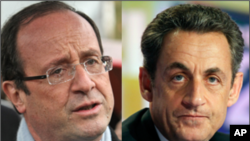The economy, jobs and immigration are hotly debated issues during France's presidential campaign. But foreign affairs are taking a backseat - and the country's longstanding ties with Africa are no exception.
The Chateau Rouge neighborhood in northern Paris is a second home to many immigrants from North and sub-Saharan Africa. The busy streets are lined with African hairdressers, restaurants, clothing shops and phone stores offering cheap calls to families back home.
There are also a few battered posters of the two finalists in Sunday's presidential runoff vote - incumbent Nicolas Sarkozy and Socialist Party frontrunner Francois Hollande.
Forty-year-old Paulette Wetche, a hairdresser from Cameroon, is not interested in either candidate.
Wetche, who has French citizenship, is not sure how she will cast her ballot on May 6. As far as she is concerned, all politicians make promises they never keep. So there is not much difference between Sarkozy and Hollande.
Cheikh Lo, an illegal immigrant from Senegal, does not agree.
Lo says under President Sarkozy, life in France has been difficult. He is praying for Hollande to win the elections because he believes the Socialist candidate will help illegal immigrants like himself get their working papers in France.
Sarkozy has cracked down on illegal immigration during his five years in office. During his campaign, he has also said that France has too many immigrants - in what analysts describe as a bid to woo far-right voters.
But it is not certain that Hollande will help illegal immigrants like Lo if he becomes president. In an interview on French radio Friday, he said that during the current economic slowdown, it is necessary to limit economic immigration to France - and that he would crack down on illegal immigrants.
France's relationship with Africa is, of course, far broader than just immigration. When he was elected to office in 2007, Sarkozy vowed to a radical break from traditional French-African relations, which critics say was marked by lack of transparency and cronyism.
At a 2010 summit with African leaders in the southern city of Nice, Sarkozy said France and Africa have a special relationship - and it is impossible today to address major international issues without Africa.
Has Sarkozy charted the new French-African relationship he promised? Pierre Cherruau, editor-in-chief of the online publication, Slate Afrique, is not so sure.
"It is very difficult to cut these kind of [strings] because there is a strong economic background - some very important French companies are linked to this network, like the oil business or the nuclear business - companies like Areva," said Cherruau.
Still, Cherruau says there have been some changes. Under Sarkozy, France has reduced its military footprint on the continent. Sarkozy's government also argues relations are much more transparent.
While Sarkozy has retained ties to some longtime African leaders, he has also forged new ones - including with the current, democratically elected presidents of Ivory Coast and Senegal.
Cherruau believes that if Hollande is elected, he could usher in yet more changes. Hollande, for example, took a tough line early on against former Ivorian leader Laurent Gbagbo, who once had close ties to France's socialist party.
But Cherruau says Hollande lacks African experience - and that if African leaders could vote next Sunday, they would probably pick Sarkozy.
"Most presidents in Africa feel closer to the conservative party," he said. "Because in the past, they had relations with the right wing, with the conservative party."
At Chateau d'Eau, Wetche does not believe Sarkozy has improved French-African ties. She looks at the issue from her own experience; life for her family back in Cameroon is just as tough as ever.
Wetche says things could change under an Hollande presidency. But these are hard times, she says, and it is very difficult to know which politician to trust.
News
Africa - a Forgotten Issue in French Election
- By Lisa Bryant
